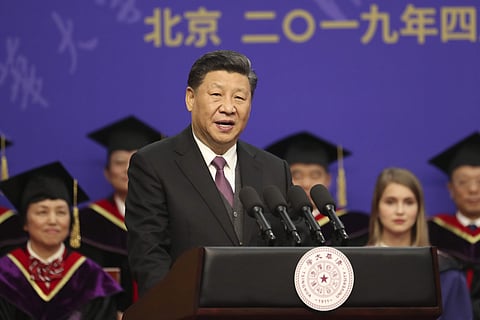

BEIJING: Chinese President Xi Jinping on Friday sought to allay the debt diplomacy concerns raised by India and the US over his trillion dollar Belt and Road Initiative (BRI), promising transparency, sustainability and zero tolerance to corruption in the costly infrastructure projects being funded by Beijing, specially to smaller countries.
The BRI is President Xi's signature global infrastructure policy. First announced in 2013, the project promises to build ports, roads and railways to revive the ancient Silk Road and create new trade corridors linking China to Asia, Africa and Europe.
Addressing to the 2nd Belt and Road Forum (BRF) attended by 37 heads of state and governments including Russian President Vladimir Putin and Pakistan Prime Minister Imran Khan besides officials from 150 countries and international organisations, Xi said China wants to build the BRI projects based on "open, green and clean cooperation".
India, like the first BRF meet in 2017 has skipped the Friday meeting as protest over the USD 60 billion China-Pakistan Economic Corridor (CPEC) being laid through Pakistan- occupied Kashmir.
The CPEC, which connects the strategic Gwadar Port in Pakistan's Balochistan with China's Xinjiang province, is the flagship project of the BRI. This time, the US also joined India in skipping the BRF.
The Trump administration has been extremely critical of the BRI and is of the view that China's "predatory financing" is leaving smaller counties under huge debt and endangering their sovereignty.
Notwithstanding the global concerns, China has mobilised by far larger gathering of heads of state and government this time compared to the first BRF meeting held in 2017 during which 29 heads of state attended.
This time the gathering included its BRI critics of the past Malaysian Prime Minister Mahathir Mohamad, who renegotiated an over USD 19 billion rail project to be built with Chinese funding and brought the costs by USD 10.7 billion by reducing the length of the 648 km rail line by 40 kms.
The project was signed by his previous government headed by Nazib Razak who is on trial for corruption.
Prime Minister Khan himself was critical some of the CPEC projects and wanted to cut the size of the USD 8 billion Karachi-Peshawar rail line, the biggest project under the CPEC, by USD 2 billion.
In his speech, Xi, also General Secretary of the ruling Communist Party of China, allayed fears that China was using the BRI as a geopolitical tool to attain superpower status.
He said the BRI is "not an exclusive club". "Everything should be done in a transparent way and we should have zero tolerance for corruption," Xi said.
Xi said China will not engage in beggar-thy-neighbour currency devaluation.
China will continue to improve the exchange rate formation mechanism of its currency, the renminbi, and keep the exchange rate generally stable on a reasonable and balanced level, he said.
Xi said the joint building of the Belt and Road projects has opened up new space for the world's economic growth and it has also created a new platform to boost international trade and investment, expanded new practices to optimise global economic governance, and made new contributions to improving people's well-being in all countries.
China on Thursday signalled that it is seeking to address the concerns of debt financing with a promise of "sustainable financing" for smaller countries to ease debt burden.
Concerns over BRI financing became vocal after China acquired Sri Lanka's strategic Hambantota port on a 99-year lease as a debt swap in 2017.
China is doling out huge sums of money for infrastructure projects in countries from Asia to Africa and Europe, enhancing its global influence.
Unlike his 2017 speech to the first BRF during which he announced about USD 124 billion additional financing for the BRI projects, Xi's address this year did not contain any monetary announcements pledging fresh capital for the projects.
His speech highlighted on 'co-development' focussing more on deflecting criticism and doubts about the multibillion-dollar initiative.
Xi delivered his speech just hours after an announcement by President Trump that the Chinese president would visit the White House "soon".
Some of the measures announced in Xi's speech have been under lengthy discussions during the trade talks with the US, the Hong Kong-based South China Morning Post reported.
In his address, Xi vowed to abolish subsidies to firms that impede fair competition -- addressing a major bone of contention in US trade talks.
He promised to prohibit forced technology transfer and said China will be protecting legitimate rights and interests of foreign owners of intellectual property rights.
China will allow foreign investors to operate businesses in more sectors with controlling or full stake.
China will also negotiate and sign high-standard free trade agreements with more countries, Xi added.
China will work with other parties to promote a coalition of sustainable cities and an international coalition for green development under the BRI, he said.
He said China will increase imports of goods and services on a larger scale.
China will further lower its tariff rates and continuously open up its market and welcome quality products from around the world.
He also called on all countries to create a sound investment environment and treat Chinese enterprises, students and scholars abroad as equals, he said.